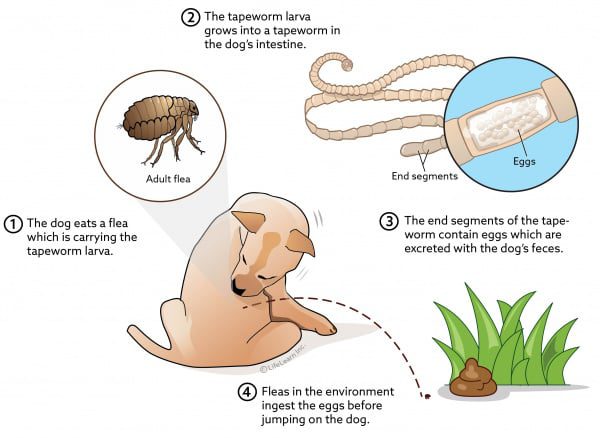
What do worms look like in a dog’s feces, why they appear and how to treat them
Any dog owner will be shocked to see worms in their pet’s feces, but unfortunately this does happen from time to time. It is not uncommon for four-legged friends to have intestinal parasites such as hookworms, roundworms, whipworms, and cestodes. Worms often cause various health problems as they are highly contagious. Usually, these parasites go undetected unless the pet undergoes routine veterinary check-ups, including testing for microscopic worm eggs in the dog’s stool. On the signs of infection of the dog with worms and how to treat them – further.
Contents
How worms affect a dog and its health
The health, size, and age of a dog are significant factors in determining the extent to which intestinal worms affect its overall health. It is also important to consider the type and amount of worms that the pet has become infected with.
Worms live not only in the stomach and intestines: sometimes they can be found in the heart, kidneys, lungs and other organs. Ringworm, which also occurs in dogs, is not actually a parasite but a fungus.

Pets can become infected with intestinal worms in many ways. A sick dog can pass the worms to puppies through infection in utero or while breastfeeding. Four-legged friends can also become infected by accidentally ingesting other dog feces containing worm eggs, or by eating an animal infected with worms. Dogs can become infected with tapeworms (cestodes) if they accidentally ingest a flea that contains their larvae.
Worms are obligate parasites that get all their nutrition from their host. Young dogs, as well as pets that are small or have weakened immune systems, may be more prone to worm infections than others.
In addition to finding worms in your dog’s stool, you may notice the following symptoms of intestinal parasites:
Diarrhea with traces of blood or mucus;
Vomiting;
Lack of normal growth and development;
Excessive exhaustion;
Bloating;
Poor condition of the coat;
Loss of appetite;
Weight loss (despite an insatiable appetite);
Paleness of the gums;
Cough (if the worms enter the lungs).
If any of these clinical signs appear, you should contact your veterinarian as soon as possible. Some intestinal worms, including hookworms and roundworms, are contagious to humans and are considered dangerous to human health. In addition, some worms, such as roundworms, can live in the soil for years and constantly infect animals that come into contact with their eggs.
Signs of worms in a dog
The four main types of worms found in dog feces are hookworms, whipworms, roundworms, and cestodes.
Hookworms – they are tiny thin worms with a hook-shaped mouth.
Vlasoglavy they look like tiny threads extending from one end.
Roundworm similar to spaghetti and can reach several tens of centimeters in length.
- Cestodes are not usually seen in dog feces, but their eggs, which look like grains of rice, are sometimes found in feces or may stick to a dog’s backside.

The best way to determine the type of worms in dogs is to take them, along with a pet stool sample, to your local veterinarian. A specialist will help identify and treat any parasites. In most cases, adult worms are difficult to see, so they are usually diagnosed in a laboratory setting. A stool sample is placed in a special solution and centrifuged for examination under a microscope for the presence of worm eggs.
Preparations for worms for dogs
Worms found in dog feces are usually easy to treat. Depending on the type of parasite, the veterinarian will prescribe a deworming drug. These drugs contain various active ingredients, usually fenbendazole, milbemycin, praziquantel, moxidectin, or pyrantel pamoate. Such preparations are available in various forms, including liquid medicines, injections, tablets, topical preparations, or chewable dragees.
As a rule, when helminths are detected, deworming is carried out twice with a difference of 10 days. If, after deworming, the dog has worms with feces or vomiting, this means that the drug is doing its job. If necessary, the doctor may prescribe the drug more than twice.
Prevention of worms in dogs
After ridding the dog of worms, it is necessary to discuss prevention with the veterinarian. Many heartworm medications that dogs take once a month are also good for preventing intestinal parasites. This simplifies the overall prevention of helminths. These medications kill any intestinal parasites that your dog might get. In order for them to work properly, they must be given to your pet as directed by your doctor.
In addition to taking broad-spectrum worming medications, your doctor may recommend that your dog have a stool sample every 6 to 12 months to check for microscopic parasite eggs. Since no drug gives a 100% guarantee, regular analysis of the dog’s feces will allow the owner to verify the effectiveness of monthly prevention and give confidence that worms will no longer spoil the life of any family member.





